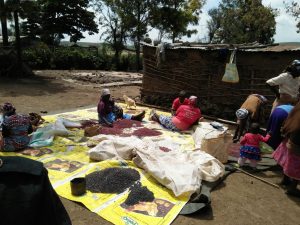
Family farming forms an integral part of feeding the population in Kenya. Households derive their livelihood from their farms either from the production of crops or animals. This is a decade practice which helps in fighting food insecurity in the country. In addition, it contributes to the conservation of agro-biodiversity and natural resources as it is part of cultural heritage in the farming communities.
The idea of Family farming is timely as the United Nations strive to achieve Sustainable Development Goals (SDGs). The approach by Food and Agriculture Organization (FAO) proposes to put farmers at the centre to achieve SDGs; No poverty,Zero hunger,Good Health and well-being,Quality education,Gender equality,clean water and sanitation, affordable and clean energy,decent work and economic growth, industry, innovation and infrastructure, reduced inequalities,sustainable cities and communities,responsible consumption and production,climate action,life below water and life on land.
The vision of the UN Decade of family farming 2019-2028: A world where diverse, healthy and sustainable food and agricultural systems flourish, where resilient rural and urban communities enjoy a high quality of life in dignity, equity, free from hunger and poverty.

To achieve this vision, various pillars from local to global level forms the basis of actions. Countries need to; Develop an enabling policy environment to strengthen family farming, support youth and ensure the generational sustainability of family farming, promote gender equity in family farming and the leadership role of rural women, strengthen family farmers’ organizations and capacities to generate knowledge, represent farmers and provide inclusive services in the urban-rural continuum, improve socio-economic inclusion,resilience and well-being of family farmers, rural households and communities, promote sustainability of family farming for climate-resilient food systems and lastly to strengthen the multi-dimensionality of family farming to promote social innovations contributing to territorial development and food systems that safeguard biodiversity, environment and culture.
This is necessary because farming is faced with numerous challenges which affect its success. Farmers continue to experience high post-harvest losses, undeveloped marketing systems and value chains, high cost of production, low farm investments, loss of biodiversity, less agricultural extension, land fragmentation due to increasing population, less government support, gender disparity in ownership of land, dominance of production by old population, declining consumption of local food, declining space of farmers’ rights, less crop diversification, soil degradation, unfavourable agricultural policies and climate change.
This was vividly and thoroughly tabled during the event. Speaker after speaker highlighted the plight of the family farmers from their respective regions; Africa, America, Europe and Asia. It was evident from different parts of the world that this category of farmers comprises the majority. Various governments and agricultural actors have injected billions as subsidies or payments to boost production. It was also notable that there is an unacceptable loss of biodiversity and unsustainable production in various parts of the world.
This is an area Seed Savers Network has tried to raise awareness in Kenya. This is in line with our mission ‘To

conserve agro-biodiversity by strengthening communities’ seed systems for improved seed access and food sovereignty.’ It was a great honour to get the opportunity to join like-minded organizations and share our experiences in the conservation of biodiversity which is closely linked to food and nutrition security during the UN Decade of Family Farming Launch, FAO Headquarters-Rome.
Mr Daniel Wanjama, Seed Savers Network Coordinator represented the organization in various forums with the message of empowering family farmers to conserve their agro-biodiversity for well -being of the population. The drive being helping each farmer to have access to diverse and less costly seeds for planting to contribute to the mitigation of climate change, fighting food insecurity in the country and also enhance food sovereignty.
Agro-biodiversity loss is one of the challenges! This is a wake-up call to various stakeholders in the agricultural sector to combine efforts and expertise through consortia to eliminate various challenges facing family farming. This has also been affirmed during the event and in the future family farming will receive high attention in various regions.
Seed Savers Network as a grassroots organization for family farmers is keen to take full advantage of the global attention on family farmers and transform policies and goodwill to tangible support that will change the lives of family farmers within the decade.
Resources
FAO and IFAD.2019.United Nations Decade of Family Farming 2019-2018.Global Action Plan. Rome

